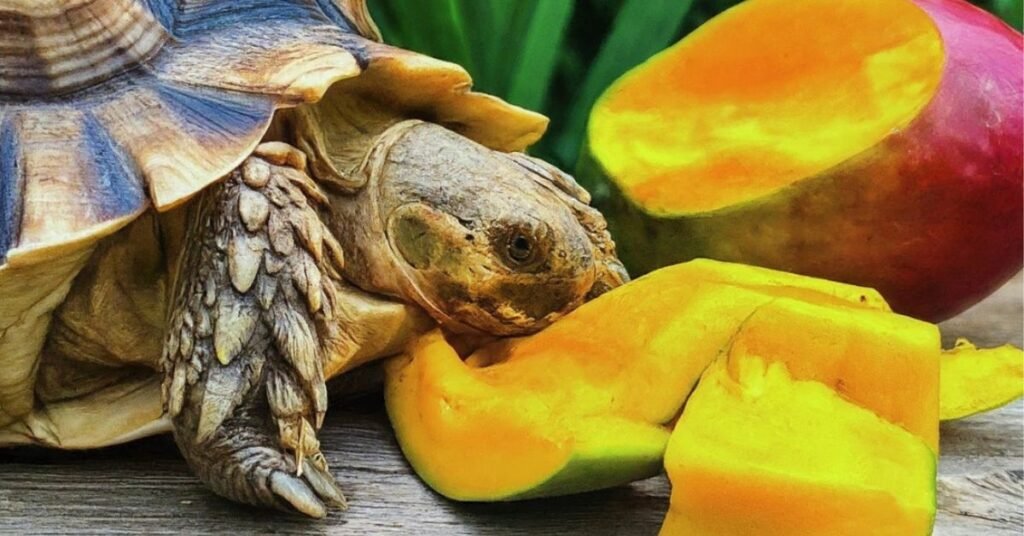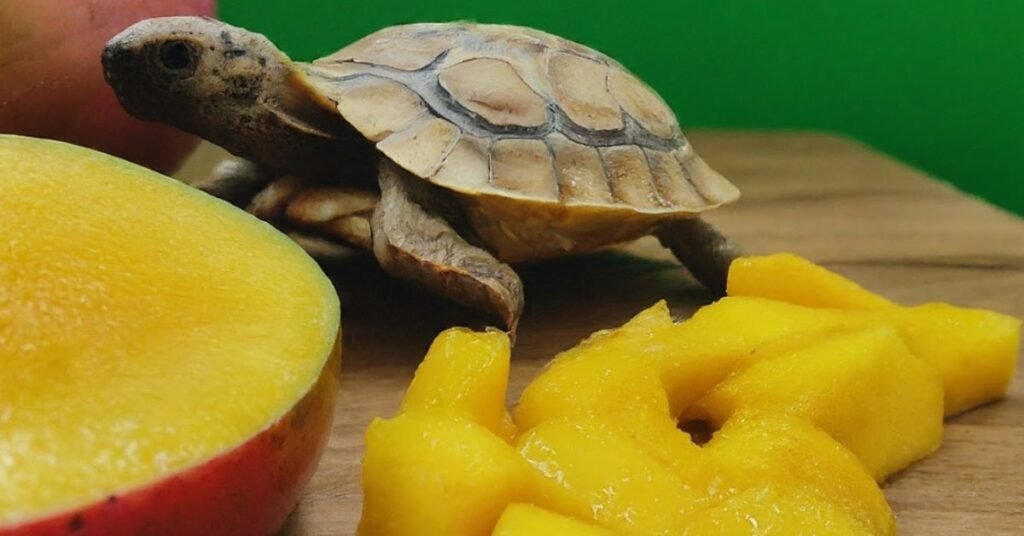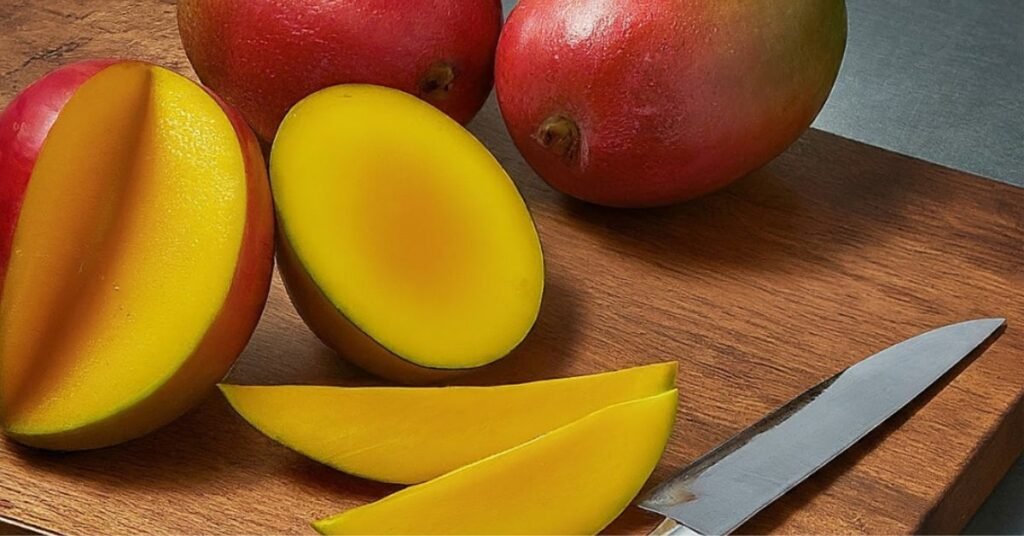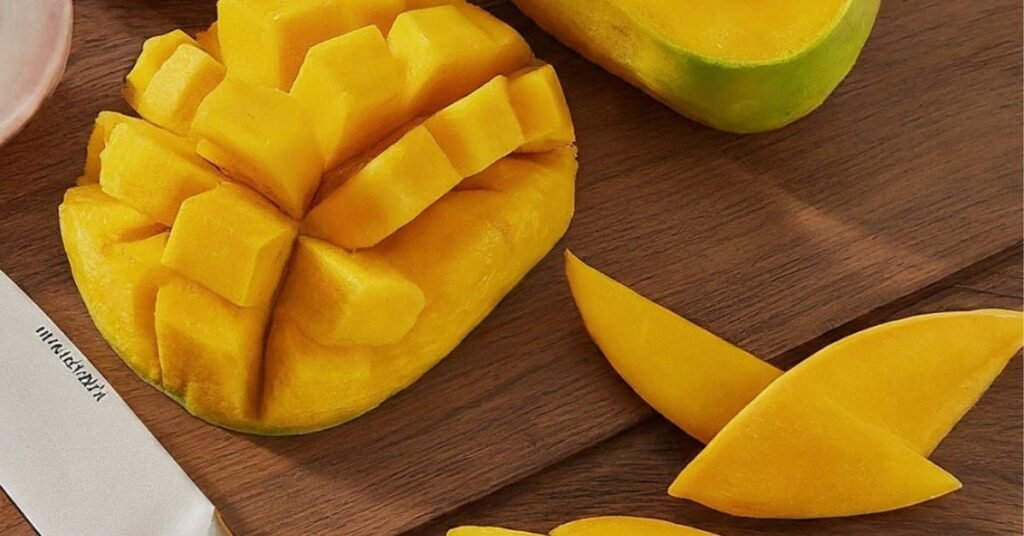Mangoes are such a delicious summer treat for us. Meanwhile, turtles are known for their varied diets. However, it’s essential to know which foods are safe and healthy for them. As a turtle pet owner, have you ever found yourself wondering, “Can turtles eat mango?” Mangoes are a sweet treat that can be part of your turtle’s diet, but moderation is key.
Mangoes offer a range of benefits, such as vitamins and minerals that support turtles’ well-being. Although, the high sugar content in mangoes means you should limit their intake to avoid health issues. If you are searching for the answer to the question “Can turtles eat mango?”, we have got your back. In this post, we will discuss the mango diet in detail for turtles.
Table of Contents
Can Turtles Eat Mango?

Yes, they can. Turtles can indeed enjoy mangoes as a sweet treat, but it’s essential to feed them in balance. Mangoes are rich in vitamins like A, C, and K, which support the turtle’s overall health. However, their high sugar content means they should only be an occasional part of the turtle’s diet to prevent any health issues. You should serve ripe mango and cut it into small, manageable pieces to avoid choking your turtle.
What are the Nutritional Benefits of Mango for Turtles?
Let’s see what nutritional benefits mangoes contain for turtles’ health –
Vitamins for Health
Mangoes are a rich source of essential vitamins that benefit turtles greatly. They contain Vitamin A, which is vital for maintaining healthy vision and supporting growth. Vitamin C, found in mangoes, helps boost the immune system, assisting turtles to fight off infections. Additionally, mangoes provide Vitamin K, which is essential for blood clotting and bone health.
Fiber for Digestion
The fiber content in mangoes aids in digestion, which helps turtles prevent constipation. This dietary fiber also plays a role in stabilizing blood sugar levels. It is beneficial in managing weight, especially for turtles with lower activity levels.
Minerals for Development
Mangoes offer a small amount of magnesium, which supports bone strength and overall growth. While the calcium-to-phosphorus ratio in mangoes isn’t ideal (14 mg calcium to 17 mg phosphorus), you can serve a balanced diet to mitigate this aspect. Adding calcium supplements can enhance the nutritional balance when serving mango.
Antioxidant
Mangoes do contain antioxidants, which help protect cells from damage. However, the antioxidant content is not as prominent as the vitamins and minerals. While beneficial, it’s not the primary nutritional highlight for turtles.
Nutritional Ingredients Table of Mango

In mangoes, there is some more nutrition. Here are those:
| Nutritional Ingredient | Amount per 1 Cup (165g) |
| Calories | 99 |
| Protein | 1.4 g |
| Carbohydrates | 25 g |
| Fiber | 2.6 g |
| Sugars | 23 g |
| Vitamin C | 60 mg (66% DV) |
| Vitamin A | 89 µg (11% DV) |
| Vitamin E | 1.5 mg |
| Vitamin K | 6.9 µg |
| Folate | 71 µg |
| Potassium | 277 mg |
| Magnesium | 11 mg |
| Copper | 0.2 mg |
Are there any Potential Risks of Overfeeding Mango?

Feeding mango to turtles can be delightful, but it’s essential to be cautious. Mangoes are high in sugar, which might cause health issues.
High Sugar Content
Mangoes contain natural sugars that, if consumed in excess, can lead to weight gain and other health complications. To avoid these issues, limit mango treats.
Digestive Problems
Overfeeding mangoes can upset your turtle’s digestive system, causing discomfort or Diarrhea. To prevent such problems, serve small portions.
Avoiding Pits and Skin
Mango pits and skin can be toxic and hazardous. However, mango pits are extensive and complex, and turtles can not chew them. Still, try to peel the mango and remove the pit before offering it to your turtle. It ensures their safety and enjoyment.
Low Protein and Calcium Content
Mangoes are low in protein and calcium, which are vital for a turtle’s growth and shell development. Therefore, it’s crucial to provide other essential nutrients in your turtle’s diet to ensure its health and well-being.
Feeding Tips for Mango to Turtles

It’s best to follow these tips before serving mangoes to your pet turtle.
Safe Preparation
To safely prepare mangoes for your turtle, start by washing them thoroughly to remove pesticides and dirt. Peel the mango and remove the seed. Cut the flesh into small, bite-sized pieces to prevent choking and make it easier for your turtle to eat.
Recommended Portion Sizes
Mango should be offered as a treat, not a staple in your turtle’s diet. A few small pieces, about the size of a turtle’s head, once or twice a week is adequate. It helps prevent excessive sugar intake.
Balancing with Other Foods
While mango is a tasty treat, it is necessary to balance it with other fruits and vegetables. Combine mango with leafy greens like kale or collards for a nutrient-rich meal. Mixing with vegetables ensures your turtle receives a variety of nutrients required for health.
How Often Should You Feed Mangoes to Your Turtle?
Due to their high sugar content, it’s best to offer mangoes at most once per week. Excessive sugar can lead to health issues such as obesity and digestive problems.
As an occasional snack, mangoes help your turtle get the proper nutrients without overeating. You should always pair fruit treats with vegetables and protein sources to keep turtles healthy. Healthy turtles need a diverse diet.
Alternative Fruits To Mangoes for Turtles
Feeding your turtle a variety of fruits can be both rewarding and beneficial. Always remember any sweet fruit should be served occasionally to turtles. Alongside manages, here are some fruits that are safe and nutritious for turtles.
- Strawberries: These are low in calories and packed with vitamin C. They offer antioxidants that help boost your turtle’s immune system.
- Raspberries: Known for their fiber content, raspberries are great for digestion. They also contain vitamins A and C, which support overall health.
- Apples: Apples provide a good source of fiber and vitamin C. Ensure you remove the seeds, as they can be harmful.
- Grapes: These are hydrating and contain antioxidants. However, serve them in moderation due to their sugar content.
Can box turtles eat mango?
Yes, box turtles can eat mangoes, but they should consume 10-15% of their daily food intake. Mangoes are high in sugar, which can be harmful if consumed in excess. Offering mango as an occasional treat is fine, but always combine it with a variety of other foods to maintain a balanced diet.
Can baby turtles eat mangoes?
Absolutely, baby turtles can eat mangoes. Like any other turtle, mangoes should be a rare treat due to their high sugar content. At this early stage, their diet should focus more on protein and vegetables to support growth. Mangos are great occasionally but keep in mind that a healthy diet also includes plenty of protein sources and leafy greens.
Can turtles eat raw mango?
No, they should not. Turtles should be given only ripe mangoes as an occasional treat. Generally, turtles shouldn’t eat raw mangoes because unripe mangoes can be hard to digest. You should serve ripe mangoes in moderation, ensuring your turtle enjoys a sweet snack without compromising its health. Always prioritize a varied diet to keep your turtle healthy and active.
Read More: Can Turtles Eat Onions?
Bottom Line
Turtles can indulge in mango, but it’s all about balance. This sweet fruit can be a delightful treat for our shelled friends, but remember to keep it as an occasional snack. Ripe mangoes are best and should be offered sparingly due to their high sugar content. While it’s tempting to spoil them with fruity delights, you should focus on a diet rich in vegetables and proteins.
